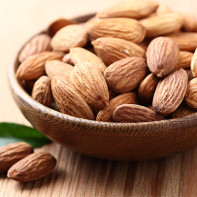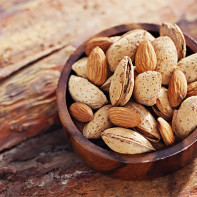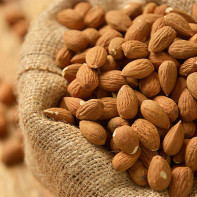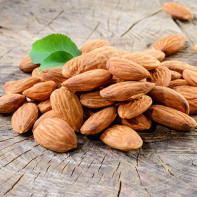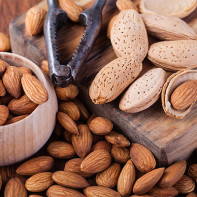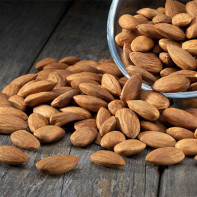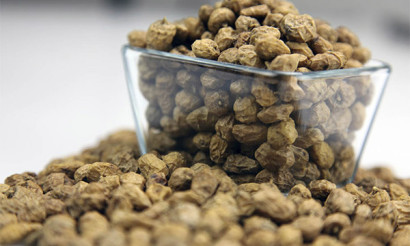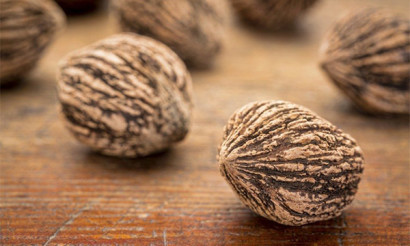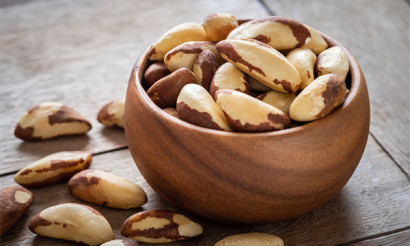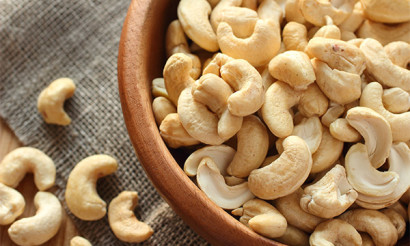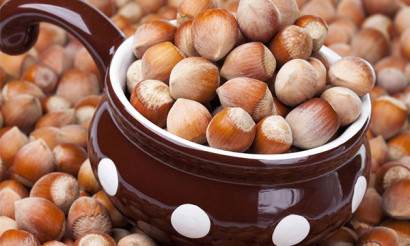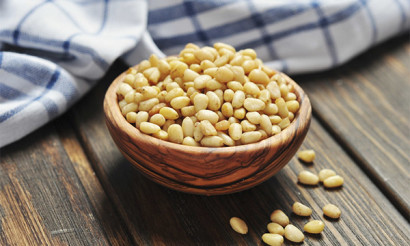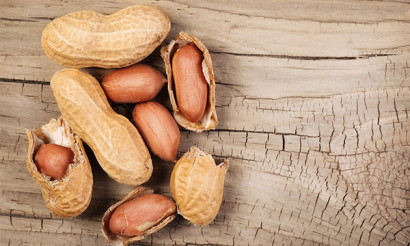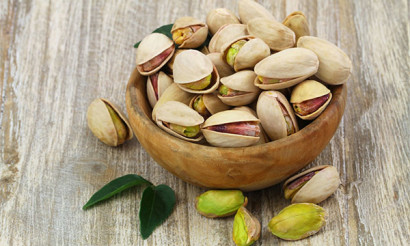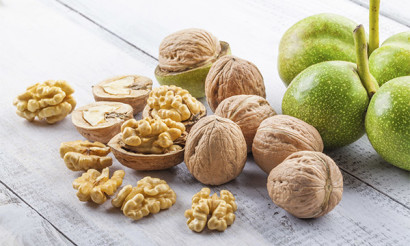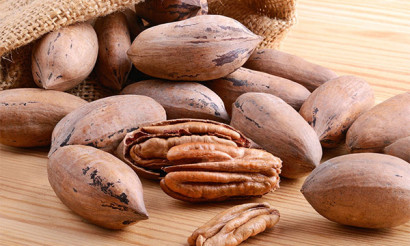Almond nuts: health properties and contraindications
Almond kernels are one of the most favorite treats on the entire planet. The delicate and exquisite flavor of nutritious kernels brings not only pleasure, but also great benefit to the body, helping to build a correct and balanced diet, calmly endure a diet and overcome stress. Let's take a closer look at this delicacy and find out if you should introduce almonds into your diet, how to do it correctly.
- How almonds grow
- Types
- What is the difference between almonds and apricots
- Healthier with almonds or cashews
- Composition and calories
- What are the benefits of almonds
- General usefulness
- For Women
- For Men
- Pregnancy
- For breastfeeding
- For Children
- Which almonds are healthier: raw or roasted.
- How to roast them
- Almond Oil: Benefits and Applications
- Benefits of bitter almonds
- Health benefits of almond milk
- How to Make
- Almond Urbech: benefits and harms
- Is it possible to eat almonds to lose weight
- Almond in Medicine
- Diabetes Mellitus
- For pancreatitis
- For Gastritis
- For bowel
- For constipation
- For gout
- For the liver
- For hemorrhoids
- Cholecystitis
- Almonds in cosmetology
- Almond Cooking
- Hazard and Contraindications
- Symptoms of Allergy to Almonds
- How to choose and store almonds
- What to eat almonds correctly
- How many almonds can be eaten per day
- Can I Eat Almonds at Night and on an empty stomach
- Can I Eat Almonds Raw
- Can they be peeled?
- Do I have to wash them before using them?
- How to peel almonds quickly
- How to Make Almond Flour at Home
- Can I Give Almonds to Animals
- Interesting Facts about Almonds
How almonds grow
Almonds are considered one of the most recognizable and popular nut grains in the world. In terms of nutritional qualities, it is similar to hazelnuts, cashews, Brazil nuts or chestnuts - fatty, rich in oil and valuable vegetable protein fruits with a distinctive taste are true to the nut line. Botanically, however, an almond is a kernel with a nutritious seed inside and unusable flesh on the outside.
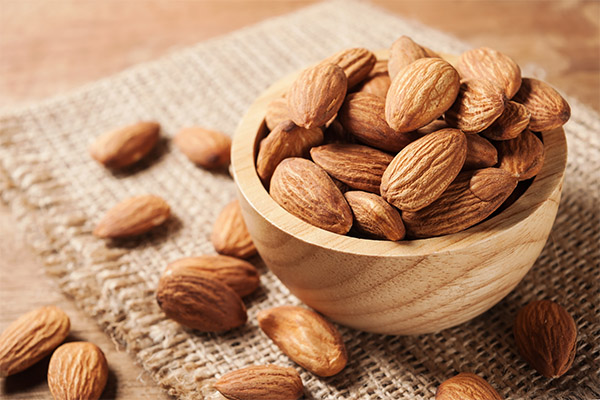
The almond tree grows in temperate climates on the plains and in rocky terrain. Its natural habitat is middle Asia and the Mediterranean. The plant can reach several meters in height and fruit abundantly. A young almond tree can be grown on your own plot - in the first years it will be as fragile as a sea buckthorn or sumac, but then it can grow like a rowan or mulberry.
The plant belongs to the Rosaceae family and is distinguished by its exquisite beautiful soft pink buds. Almonds are harvested in late summer and early fall, and on a commercial scale a special piece of equipment is used: a crane-like machine, which grips the trunk of the tree and creates vibrations. At this time all the ripe fruits fall off the branches, which are then collected, cleaned and processed for sale.
Types
Strictly speaking, the almond is a noble plant of the nut type. Its fruits, or more precisely the kernels of the seeds are characterized by a delicate texture and a pleasantly sweetish nutty flavor. Such almonds are considered edible and safe for health.
But you can also meet a similar product, which is called bitter almonds. This name refers to apricot, peach, or nectarine seeds. Since such "almonds" are much cheaper, sometimes unscrupulous sellers pass off bitter almonds as noble almonds, selling them at a high markup.
It should be understood that bitter almonds are not safe for the body, since they contain poisonous substances. As a rule, the apricot kernel is used in folk medicine, but it is not allowed to replace the sweet almonds in cooking recipes.
What is the difference between almonds and apricots?
They are called sweet almonds for a reason: they have a very pleasant taste and are of high nutritional value and contain high-quality vegetable proteins and oils. Peeled apricot or peach seeds, which are shaped very much like a fragrant nut, do not have such properties, the nutritional composition of their grains is different, and most importantly, they are not so harmless. The main feature of sweet almonds is that they can be safely consumed without harm to health, while bitter almonds are dangerous not only for people but also for animals.
Apricot kernel is sometimes used for medicinal purposes for external use. Alcohol infusions and compresses with the pulp of these grains help against joint pain and contribute to the cure of varicose veins. However, apricot almonds are not consumed as food.
Bitter almonds have a characteristic unpleasant, pungent flavor typical of amygdalin compounds. This substance is poisonous and should never be ingested by children or small pets. The critical dose for an adult is 50 pieces of peanuts, after which a lethal outcome can occur, but even 8 grains are dangerous for children.
A small body is not able to break down and digest the named substance, which means that it can accumulate in the liver and poison the blood. Therefore, the use of bitter almonds should be avoided.
Which is healthier: almonds or cashews
A comparison between nuts is always controversial because each nut has its own benefits. For example, cashews are considered as one of the fattest nuts along with walnuts and pecans. It is these nuts, which contain less complex proteins and fiber, are much better absorbed by the body in raw form and do not cause digestive discomfort.
Almonds, in turn, are a dietary nut. Its energy value among its brethren is quite low. That is why it is recommended more often than other nutritious kernels to maintain the body on diets for weight loss, restoring the body after a long illness and long-term treatment.
In its composition, almonds are not the richest nuts, so nutritionists and gurus of healthy eating recommend alternating tasty fruits in the diet to saturate the body with a diverse set of benefits.
The advantage of cashews is the tremendous benefit to the brain and digestion - the nut helps avoid senile dementia and cognitive decline. It also rarely causes allergies and promotes fast satiety without creating a feeling of heaviness. Almonds have serious limits on intake rates, but are good for skin, water balance and treatment of pelvic inflammatory diseases.
Each of the nuts has a positive effect on the body and is beneficial, so it is recommended for inclusion in the diet of adults and children.
Composition and calories
Almond kernels are valuable in terms of composition for the body, primarily high content of polyunsaturated fatty acids, vegetable protein, vitamins B and E, as well as minerals - manganese, magnesium, calcium, phosphorus and others. Nuts contain flavonoids, the amino acid arginine and other phytonutrients, the effects of which will be discussed below.
The average caloric value of almonds is up to 600 kcal. More than half of the mass fraction is fat, about 18% is protein and only 13-15% is carbohydrates.
Almonds are recommended to include in the diet as a substitute for meat and dairy products, eggs and mushrooms, as they cover most of the body's need for healthy ingredients. In this case, almonds help to assimilate other vitamins and in a properly designed diet will bring the body tremendous benefits.
What are the benefits of almonds
General benefits
Thanks to its chemical composition, almonds benefit the body at the level of many organs and systems. One of the best known properties is the ability to rejuvenate and moisturize the skin. But at the same time, almonds are an excellent preventive and strengthening product for the heart and blood vessels, controlling blood composition, maintaining the nervous and immune system, as well as for digestion. Each body can benefit from them in a different way.
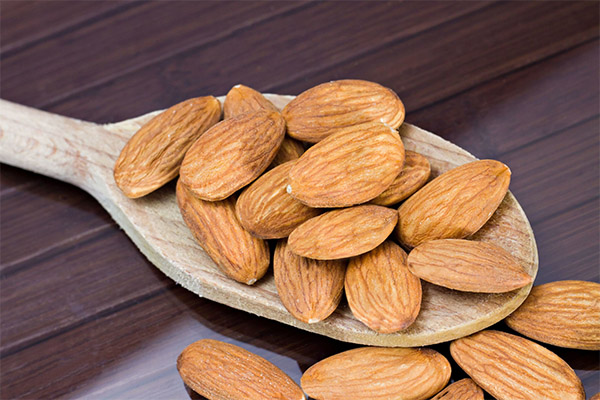
For example, for people in years, it can clear the blood vessels and stabilize blood pressure. Almonds ensure normal carbohydrate metabolism and slow the flow of sugar into the blood, so there are no spikes in glucose levels. One feels satiety and digestive comfort, which is important for healthy people as well as for diabetics and those on weight loss diets.
Almonds are important for stabilizing the nervous system because of the magnesium and B vitamins they contain. The nut keeps the brain and nerve pathways healthy for a long time, thus preserving cognitive functions and mental clarity.
The nut is also useful for digestion. It not only affects blood composition and pancreatic function, but also cleanses the intestines, preventing the development of constipation and normalizing the microflora of the gastrointestinal tract.
Also, the antioxidant properties of almonds make them a great preventive agent against cancer, aging and the negative effects of the environment.
For women
Almonds for women are valuable for their anti-inflammatory properties. For many centuries, it has been used to treat reproductive diseases and restore the body after childbirth. Vitamin E helps to maintain water balance and reduces inflammation in the body.
Almonds are useful for losing weight. Nourishing nut replaces fatty meat dishes, combining it with vegetables, eggs and dairy products. Almonds in small quantities promote fast satiety, excretion of toxins and maintaining the health of the liver and brain during diets.
Almond kernels are rightly considered to be a rejuvenating remedy. Regular consumption of kernels improves complexion, makes skin and hair silky, eliminates rashes, improves body odor. Almonds stimulate the production of elastin, so the skin tightens, and the contours of the face and body become firm and attractive. Not without reason almond oil is widely used in cosmetics not only for face and body - in massage balms, scrubs and mixtures for wraps.
Some experts even claim that almonds are a strong aphrodisiac, awakening women's sensitivity and desire, as in the years of early youth.
Almonds are also useful for restoring the elasticity of blood vessels, which will help to cure varicose veins and hypotension, improve blood circulation in certain parts of the body, get rid of cellulite, accelerate hair growth and tighten the breasts naturally.
For men
Since ancient times, almonds have been considered one of the most powerful remedies for prostatitis and other male ailments. It eliminates inflammatory processes, promotes regeneration of healthy tissues, helps to restore a healthy blood supply, thus improving erectile potential.
The health effects of almonds on the cardiovascular system ensure the prevention of heart attacks and the development of atherosclerosis. Almonds promote healthy muscle development and can be a major source of protein, along with other nuts, for vegetarians and raw people.
In Pregnancy.
The benefits of almonds during pregnancy come down to not only supporting the development of a healthy fetus through vitamins, minerals and valuable amino acids, but also manifests in keeping fit. Nuts stimulate the production of collagen, which allows you to avoid stretch marks, and after childbirth - quickly restore the figure.
At the same time, almond kernels help to quickly satisfy hunger, avoid developing anemia and support the nervous system, eliminating mood swings and sleep disorders.
When breastfeeding
During lactation, almonds are valuable because of their high calcium content. It enriches milk, makes it pleasant to the taste and easy to digest. Also, the nut will help a woman to protect her breasts from discomfort, moisturize the skin and make it elastic.
For kids
In a baby's diet, almonds are a source of protein and calcium. It gives satiety, promotes brain development and immunity, helps to develop strong muscles, protects children's teeth from destruction, promotes rapid healing of abrasions and prevents scarring.
Almonds give energy for several hours and help the baby to avoid unpleasant feelings of hunger during the day. At the same time, the nut strengthens the immune system, which reduces the frequency of colds and infectious diseases.
Which almonds are healthier: raw or roasted
There are many ways to eat almonds. Adherents of naturalistic nutrition insist that it contains extremely harmful compounds of phytic acid, which is why the best way to prepare it is soaking. For this purpose, the nuts are poured with brine at a ratio of 1:2 and kept in salt water for 12-16 hours. After that, harmful substances go out of them, and the kernels become edible.
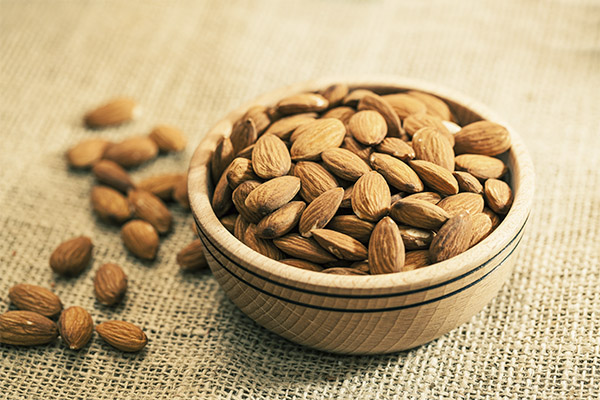
Those who are not afraid of the harsh effects of plant proteins and acids recommend eating almonds raw, as long as they have all the useful substances active. Specialists warn that it is better to peel raw almonds, because it contains more of the same phytic acid.
Roasted almonds are slightly inferior to the raw version and are suitable for people with an intolerance of nut proteins. If the raw almonds cause intestinal discomfort, flatulence or heartburn, it is better to use them roasted. But if even this method of processing does not get rid of bloating and discomfort, then it indicates an allergy.
Roasted almonds may be easier to digest and interact with other foods. About which type of processing is appropriate, you have to judge only by personal experience, because each body has its own needs and capabilities.
How to roast
Roasting almonds for the table or to add to dishes is easy. There are several ways to roast almonds deliciously. One is to roast the nuts in the oven. For this, it is desirable to choose a temperature of 60 degrees, not to dry out the fruit, but only to give them a little browning. During such roasting it is necessary not to forget to stir the nuts, so that they come up evenly and do not burn.
Another way is with the use of a pan on the surface. The kernels can be roasted on a dry surface, stirring constantly, or you can make a snack - sweet candy or salty snacks. To get delicious salted almonds, you can heat them in a large amount of rock powder poured in a pan - the salt will absorb excess moisture and harmful substances, and give the nuts a subtle flavor.
You can fry nuts in oil with the addition of your favorite spices - turmeric, aromatic herbs, cinnamon or cloves. Keep in mind that adding sugar syrup and vegetable or butter will greatly increase the caloric content of the product, so it will no longer be considered dietary and will become more difficult to digest. The daily portion of such almonds should be reduced to 10-15 nuts.
To caramelize almonds, you need to melt a spoonful of butter in a pan and add 2-3 tablespoons of sugar, brown if desired, which will give a fine burnt flavor. After that, the kernels "stew" in the red-hot mixture under a lid, stirring occasionally, and at the end, remove the lid, so that they are covered with thickened syrup on all sides.
Almond oil: benefits and uses
Almond oil is squeezed from the nuts cold, so that the liquid remains a maximum of antioxidants, vitamins and other beneficial substances. It has healing, regenerating and nourishing properties, so it is introduced in the diet and widely used in cosmetology.
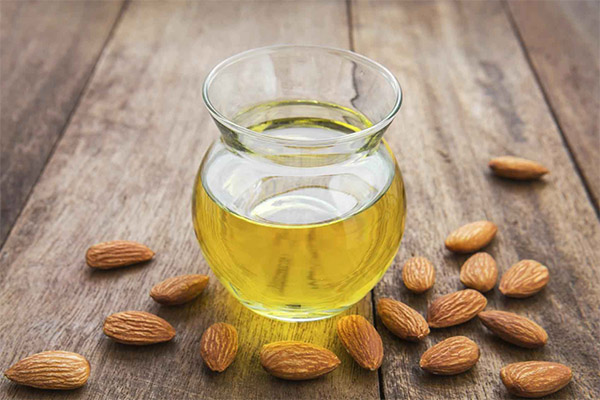
Almond oil can be an excellent base for many home cosmetics:
- Moisturizing and nourishing creams for dry and sensitive skin.
- Soothing balms that smooth out irregularities, heal skin lesions and make the skin look taut and silky.
- Facial, body and hair masks to give radiance, smooth texture, saturation with moisture.
- Massage mixtures for rejuvenation, skin tightening, getting rid of "orange peel", stretch marks, relieving fatigue.
In dietetic nutrition, almond oil helps restore the pH of the gastrointestinal tract, relieve symptoms of gastritis and other inflammatory diseases, support the health of the liver. It serves as a prebiotic to restore normal digestion, as well as gently cleanses the intestines and prevents constipation.
Also, almonds are recommended for heart patients, diabetics and people suffering from atherosclerosis to naturally clean the blood and blood vessels, to strengthen elastic tissues and keep them toned and healthy.
Locally, almond oil can be used to lubricate lesions such as hemorrhoids, insect bites, acne marks, seborrheic areas with peeling. This will nourish the cells, accelerate their renewal, relieve itching, tightness and other unpleasant feelings, help avoid the appearance of scars or age spots.
The benefits of bitter almonds
Bitter almonds are characterized by the presence of poisonous compounds, which along with their negative properties are famous for their anti-tumor effect. In addition, the bitter varieties of noble almonds are a pain reliever, used to combat parasites, treat joints. Previously, the fruit of bitter almonds treated respiratory tracts and used as a sedative.
The beneficial properties of almond milk
Fragrant almond milk is one of the favorite delicacies of many, it is especially loved by supporters of diets, vegans and people with an intolerance to animal dairy products. Almond milk is a delicate and pleasant-tasting product with a nutty smell and soft texture. It is used as a base for cocktails, added to coffee, to porridges and smoothies, to puree soups and sauces. Nutritious and vitaminized product not only replaces animal products, but also perceived as an independent delicacy.
How to make
To find almond milk on store shelves today is not a problem, but all those who doubt the quality of the production raw material, without much effort can prepare it themselves at home - without preservatives, emulsifiers and chemical additives.
A homemade recipe for almond milk is not difficult:
- 1 cup raw almond kernels;
- 3 cups of cool drinking water;
- auxiliary ingredients: 1-2 cups of boiling water, cold drinking water, salt.
Preliminary kernels should be washed and soaked overnight with a little salt. The almonds will swell and the water will become a little cloudy. Then the raw material must be cleaned. To do this, boil the almonds for 2 minutes in boiling water, then rinse with cold water and remove the "clothes". If you do not remove the husks, the milk will be heterogeneous and tart to the taste.
The resulting billet put in a blender and pour 1 cup water. Grind the mass until homogeneous, then bring the rest of the water - and mix everything again. The ready milk should be strained through heavy gauze, in the resulting liquid, if desired, you can add vanilla, cinnamon or banana mass.
The cake from the nuts is recommended to be added as a filler to cookies, sauces and meat - it will give a little spicy flavor. A large amount of leftovers can be dried and ground into flour.
Almond Urbech: benefits and harms
Urbech is a nutritious dessert paste native to Dagestan. Such a snack is made on the basis of fatty seeds and nuts of all kinds, except for them, adding honey and butter to the paste. It is because of its natural composition, such a dessert is considered beneficial for the body.
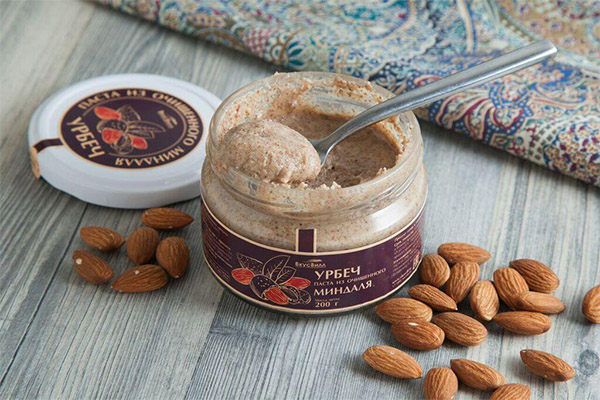
Urbech with almonds nourishes the brain and promotes rejuvenation, reduces inflammation in the body. Such a product is indispensable in cold weather and during intensive work - both mental and physical. Pasta is great support during colds, when the body is unable to digest coarse food, but is in dire need of nutrition and energy.
Lovers of the southern delicacy should be careful - such pasta can be eaten no more than 2 spoonfuls per day with other food, so as not to overstrain the digestive system and not to harm the figure.
Is it possible to eat almonds when losing weight
Dietitians warn: inordinate consumption of almonds can harm the figure, as well as overload the digestive organs. To easily survive the diet, you can and should introduce small portions of nuts into your diet. This will help:
- Maintain strength and energy throughout the day.
- Satisfy hunger attacks due to the richness of the product and the richness of fiber.
- Replace sweets because of the nutritious sweet taste of the proteins.
- Balance digestion.
- Maintain healthy brain function, avoid hormonal imbalances, emotional outbursts, and apathy.
- Maintain a fresh and healthy appearance, clear skin, and eliminate signs of stress and exhaustion.
Popular celebrity diets include 8 almond kernels a day. They can be added to your morning porridge or smoothie, eaten with breads as a paste, taken as a snack for a second breakfast or afternoon snack, or sprinkled on dessert at lunch. It is better not to eat almonds at night: they not only take a long time to digest, but also threaten the figure. Almonds are recommended to eat no later than 6-8 hours before going to bed.
Almonds in medicine
In folk medicine, almonds have been used for a very long time. The oil of the plant was used to treat abrasions, injuries, inflammation, sore throats, and sexually transmitted diseases. Also almonds helped to normalize digestion and improve vision.
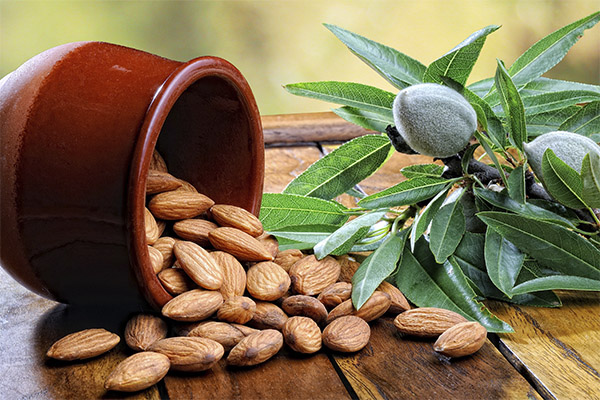
Nutritionists recommend to include almonds in the diet of all those who experience mental stress and strain, physical laborers and athletes. Almonds should be present in the diet along with other nuts to recover from long debilitating illnesses.
Almonds, like no other nutritious kernels, are useful during diets for weight loss, for recovery after childbirth or prolonged starvation.
For diabetes.
To control blood sugar, almonds are considered very effective. It slows the intake of glucose, preventing spikes in sugar and thus normalizing the patient's condition. Almonds satisfy hunger for a long time, help to keep cholesterol under control, and also have a beneficial effect on the skin.
Caution should be exercised only by people with diabetes who are overweight and obese. In such cases, you can consume almonds in strict dosage - no more than 3 kernels a day.
Important: The glycemic index of almonds is 10 units.
For pancreatitis
Although almonds are anti-inflammatory, it is not recommended to eat them after exacerbations of pancreatitis due to the high fat content and caloric content of the product. Almonds can be consumed during remission in small portions to saturate the body with valuable substances and purify the blood.
For gastritis
Almonds can serve as a good remedy for gastritis, they gently lubricate the walls of the stomach and help to relieve irritation. But there are two sides to this coin. In some cases, nuts may cause allergic or sensitive reactions, provoke heartburn and have a choleretic effect. It is advisable to consult a gastroenterologist before consumption.
For the intestines
Almonds are good for the intestines in several aspects at once. They help to cleanse the blood and remove toxins, waste and unprocessed food, so that the absorption of useful substances is improved. In addition, almonds can help to relieve inflammation and establish a regime of going to the toilet.
For constipation
Almonds are considered a mild laxative, so when constipation occurs, they can alleviate the condition. The dietary fiber will help cleanse the bowels, and the soft texture of the almonds will form soft stools. At the same time, you should not get carried away with such a remedy. In severe cases, nuts can cause bloating. Therefore, they should be used after cleansing the intestines with an enema to restore microflora and normalize the process of defecation.
In gout
Nuts as a fatty product in acute forms of gout should not be consumed. However, in a quiet period in minimal quantities, almonds can be eaten, betting on its beneficial effect on other systems. For example, it significantly improves blood composition and stimulates the excretion of purines, and in addition, supports the heart and brain. If the disease is neglected, it is worth checking with your doctor for special indications.
For the liver
The soft nutty texture with beneficial polyunsaturated fatty acids and vitamin E helps restore healthy liver cells, cleanse it of toxins and function properly. When consumed in moderation, almonds can help rejuvenate the organ and give the body new strength.
In hemorrhoids.
Due to the content of healing substances, almond oil as an external application and in food will contribute to the regeneration of damaged tissues, reduce swelling and inflammation, as well as have a preventive antihelmintic effect in hemorrhoids.
For cholecystitis.
Those who have been diagnosed with gallbladder pathology, as well as those who have suffered the acute phase of the disease, for a time will have to exclude almonds from food - for about 6 months. At the same time, nuts are an excellent substitute for fatty meat in the diet and help regulate blood cholesterol, which is useful for patients with this diagnosis. For detailed dietary instructions, you should contact your doctor.
Almonds in cosmetology
The oil obtained from the aromatic nuts is highly valued in cosmetology. The high concentration of vitamin E and natural antioxidants makes it most beneficial for the skin. Almonds moisturize and nourish the skin, they are especially useful for dry and sensitive skin. Almond milk gently cleanses and produces a lifting effect by stimulating the production of collagen, rejuvenating and renewing cells.
Almond oil and milk can be used in the preparation of nourishing mixtures or added to organic cosmetics, as almonds are often used in skin care products for their healing and rejuvenating properties.
Using Almonds in Cooking
In the kitchen, almonds are widely used not only in dessert dishes, but also in main dishes. Many recipes have come to us from Asia, but there are also European deliciousness with this delicate nut. The greatest value is the nut for raw eaters and vegetarians, as well as people with intolerance to lactose or milk proteins.
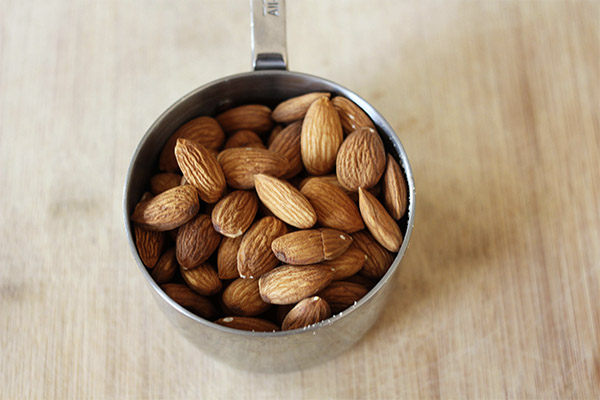
- Almond milk can replace regular milk along with its soy, wheat and coconut counterparts. Almond milk is rich in valuable proteins and quality fats and tastes very good.
- Almonds are used to make flour to create flavorful baked goods and candies, to thicken porridges, yogurts, smoothies, and milkshakes. They are added to salads and sauces to enrich them with protein and thicken low-calorie dishes for a feeling of fullness.
- Crushed or sliced almonds make a great filling for casseroles, meat dishes, pies, and topping for dairy and fruit desserts. They are most commonly sprinkled on cereals, ice cream, cakes and sometimes even on drinks.
- Almond oil is commonly used to dress salads and add it to desserts to give a zesty note of flavor.
- Whole nuts are taken as a snack, added to breakfast or added to side dishes in dinner sets.
- Often almonds can be found in pastries. It is chosen as a filler for chocolate, it is used to make fondant candies, marshmallows and marzipan, complemented by grilliage and candyfloss. Almond halva can also be found. Fat, but at the same time delicate flavorful almond cream is used as a base or addition to ice cream, smeared on cakes, served with pancakes and waffles. It can also complement fruit salads.
- In main dishes, almond crumbs can fill vegetable stews and salads, stuff baked poultry, add it to sauces and cream soups.
- Almonds go well with dark, milk and white chocolate, sesame seeds, coconut, in harmony with the flavors of cherries, oranges, peaches and pumpkins. Among vegetables it is combined with tomatoes, peppers, eggplant, onions, as well as fish, red meat, cream and honey. Among the spices that go well with almonds are cinnamon, turmeric, nutmeg, saffron and aromatic herbs.
- Almonds are used both raw and roasted. As a snack, kernels can be fried in oil with salt and spices, caramelized in sugar and honey, combined with spices.
Harms and contraindications
Almonds are not the safest nuts. It contains in small quantities amines and salicylates, as well as amygdalin - these substances can cause allergic reactions and even poisoning of the body. Therefore, before using the nut regularly, you should make sure that you are not allergic to it.
Another side effect of almonds is the "unnecessary" headache. This happens because of the harmful compound contained in almonds, which provokes migraines. In case of such a symptom, it is not necessary to refuse from eating almonds, it is enough to reduce the portions and observe if the unpleasant symptoms recede.
The third "sin" of almonds is their high caloric content. Almonds, as well as other nuts and seeds, contrary to the traditions of many cultures, are not recommended to eat in combination with sugar, honey and fatty oils so as not to aggravate the liver, pancreas and GI tract.
An overdose of nuts can cause poisoning, which is manifested by symptoms of nausea, headache, cramps in the digestive tract, dizziness and general malaise. In such cases, flushing is necessary, and activated charcoal may serve as a temporary measure.
Careful use of almonds is recommended to people with a sensitive gastrointestinal tract, who have suffered heart attacks and diseases, patients with pathologies of the nervous system. In the presence of acute diagnoses, it is necessary to consult with the attending physician about the permissible products and an individual diet.
Symptoms of almond allergy
Such an unpleasant condition as an allergy is always accompanied by swollen lymph nodes, elevated body temperature, and itching or skin rashes. In addition, headaches, nausea, diarrhea, intestinal cramps and flatulence, muscle discomfort, tearfulness and mood swings can all occur in the case of almonds.
The easiest way to test if your body is reacting to almond fruit with rejection is to take a few drops of the oil and apply it to the delicate areas of skin on the inside of your hand. But sometimes this is not enough. Then it is necessary to exclude any other potential allergens from the food for the period of testing and add almonds to the safe foods. If unpleasant symptoms occur, the allergy will be determined in relation to the almonds.
Allergic reactions to almonds are a serious signal from the body, as the product is indeed potentially dangerous. Perhaps the body of the patient with the detected allergy is more sensitive to the poisons of the nut. Almonds should never be consumed in excess.
How to choose and store almonds
When choosing almonds, the buyer should be interested in the freshness of the nuts and the right choice of variety. The less time has passed since the harvesting, the more nutrients are preserved in the product. Fresh almonds will have a light herbaceous-nutty smell, a whole skin that protects the kernels from mold and other lesions, an even shade without stains and plaque.
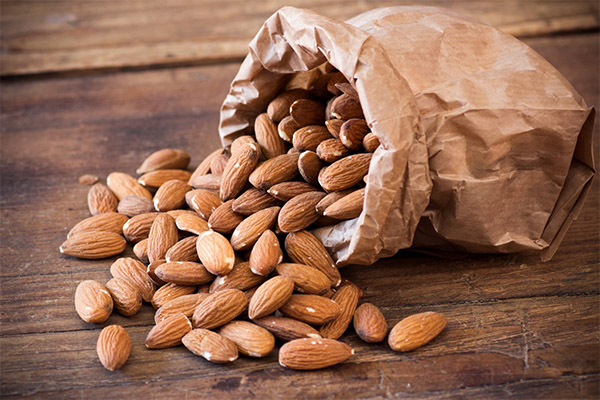
It is important to distinguish a sweet noble almond from an apricot kernel. A real nut fruit has a regular elliptical shape without kinks, it is oblong and usually about 1.5 cm in length. Its taste and smell is delicate, silky and slightly milky.
Bitter almonds are shaped like sunflower seeds - with a wedge at the tip. While the noble nut has a distinctly striated skin with or without soft relief, fruit pits have a monochromatic reddish-beige coating and many small wrinkles on the surface. The taste of the seeds is less creamy, harsh with a bitterness, reminiscent of cherry, and sometimes a little "alcoholic.
Since almonds have dense skins, they should not be peeled off, otherwise you might say the nut is stale, overdried, or spoiled.
When storing, it is important to keep the nuts from oxidizing in the open air and under direct sunlight. You can store them in the fridge or even in the freezer - then they will not go rancid. The best option is a glass jar or a tight baggie.
How to eat almonds correctly
Since the product is a potential allergen and is rich in oils and protein, which can be hard on the digestive system, it is recommended to consume it in doses. At the same time, not every body safely tolerates raw almonds, so in some cases it is necessary to roast them.
Usually the difficulty in digesting almonds is due to the complex proteins and fiber in their composition, which significantly change their structure during thermal processing. To get the most out of almonds, it is recommended to consume their oil fresh cold and heat-treated flour or nuts.
How many can be eaten per day
In children's food, it is desirable to introduce the nut not earlier than 4 years, starting with the 1st and then 2-3 kernels. At school age, children can be offered up to 8 peanuts. For adults, cardiologists and nutritionists recommend the daily rate of 30 grams of almonds - about 22-23 kernels (a small handful). Men can eat 3-5 more nuts than women due to their metabolism peculiarities. It is enough to eat almonds 3-4 times a week, if you eat this kind of nuts every day, the rate can be reduced.
Care should be taken with the consumption of almonds for the elderly, people with GI problems, gall bladder, brain, because the fruit can be difficult for the emaciated body. In controversial cases, it is appropriate to consult a doctor about the rates of consumption of the product in each individual case.
No matter how useful almonds are, it is worth alternating them in the diet with other nuts and grains, as well as to balance the menu, replacing hearty nuts with meat, eggs, fat cheese or sour cream. Then the body will receive all the necessary things, keeping high performance, vigor and a healthy fresh look.
Can I Eat Almond Fruits at Night and on an empty stomach?
Eating almond fruit before bedtime is not recommended because of the heaviness of its food substrate. It is desirable to eat kernels in the morning or at lunchtime. The following is also necessary to take into account that it is undesirable to eat nuts on an empty stomach for the same reasons - first the body needs to wake up, and only later - for the second breakfast - to start digesting complex food.
Nevertheless, delicate almond milk combined with other foods - especially greens and non-sour fruits - would be a great breakfast cocktail. Someone even prefers to cook an omelet with such a supplement.
Can I Eat Raw Almonds?
On whether it is possible to eat raw almonds, experts argue even today: some say that it contains harmful phytic acid and the nut, at a minimum, should be soaked, others argue that only in the fresh raw kernels is preserved maximum useful substances and antioxidants.
To reduce the harmful effects of the nut, nutritionists recommend peeling it from the husk at least half the time, as well as leaving the kernel in the brine overnight before consumption if desired.
Can you eat almonds with their peel?
There are no particularly harmful substances in the skin of almonds, on the contrary - it is a valuable fiber, so you can eat it. But if it would spoil the look of the dish or the consistency of the cream, it is better to remove the peel.
Do I need to wash them before using them?
If the nuts are bought by weight in a supermarket or specialty shop, it is definitely worth rinsing them in several waters, holding them under an aerated stream or even scalding them with boiling water. This will help to mechanically wash off all the dust, foreign matter and bacteria. After all, nuts make a long way to the table before reaching the table, lying on the shelves, and sometimes, when the seller does not observe storage conditions, they even get covered with fungus. This is another argument in favor of freeing the kernels from the rind before eating them.
How to peel almonds fast
When almonds are used for decoration or added to delicate creams and sauces, the rind can ruin the whole look. In such cases it can be quickly and effortlessly removed. There are two simple ways.
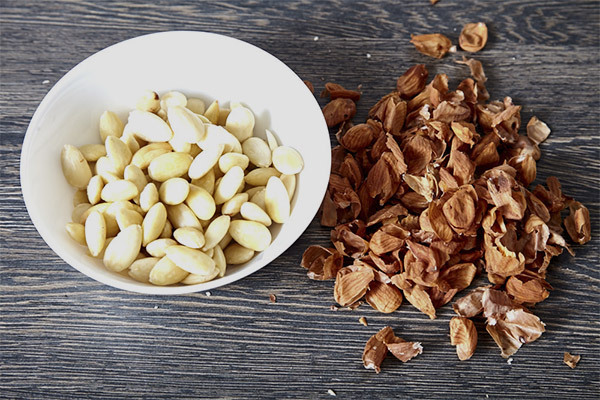
You need to put the almonds in boiling unsalted water for 2-3 minutes, then take them out and pour cold water. The kernels in such conditions will not have time to boil, but the skin from the temperature difference will depart. After that it can be easily removed and the almonds can be dried on paper towels.
Another way is to pour boiling water over the seeds for 15-20 minutes. After cooling, you should try it: if the peelings are good, then proceed, and if the 1 procedure is not enough, you should repeat the "bath time".
The remaining husks do not have to throw in the trash - it may be useful for cosmetic or medicinal purposes. Dried husks can be infused in water and get a great moisturizing lotion for face and body or hair rinse. Since vitamins and valuable compounds are accumulated not only in the kernels, but also in the husks, the product will perfectly nourish and refresh the skin and hair, strengthen the nails, increase elasticity and eliminate peeling.
How to make almond flour at home
In production or at home, flour is usually made from defatted meal, that is, the cake of almonds. First, the hearty kernels are passed through a press to drive out all the oil by cold pressing. This leaves a dry substance consisting of nut proteins and dietary fiber. Such a raw material is a dietary product that does not contain extra calories, but it feeds the body with valuable "building material" and promotes cleansing.
The remaining cake is dried in an oven, distributing evenly the wet mass on a sheet, after which the resulting rubbish can be grinded in a coffee grinder, mortar or blender - any convenient way. The result is a delicate, creamy powder that makes many meals healthy and delicious and is a great organic addition to homemade protein shakes for athletes, fitness models, pregnant women, vegans, and anyone who prefers a healthy diet.
Can we give almonds to pets?
It is very important to make sure that poultry or pets do not eat bitter almonds - this is extremely dangerous to their lives because of the hydrocyanic acid content in the fruit. Noble varieties are also undesirable in the diet of animals, especially small animals. Often experts warn against giving almonds to squirrels, birds and other animals.
For dogs, it is recommended to give nuts for the growth of a healthy shiny coat and the overall health of the body. But we must keep in mind that even the sweet variety can cause diarrhea in the animal and provoke more serious disorders. Maybe 1 or 2 casually eaten nuts won't do any harm, but regular consumption will damage the health of the pet.
Interesting facts about almonds
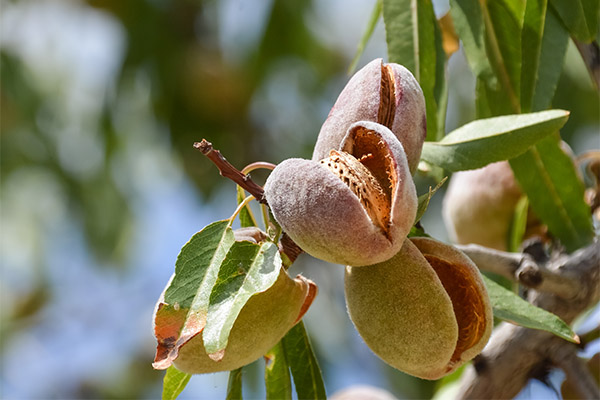
- Botanically, the almond tree is a type of plum. That is why the aroma of its grains is so similar to other smells of the rosaceous family - apricots, cherries, peaches.
- On New Year's Eve in Switzerland, they bake a festive cake and hide an almond kernel inside. Whoever gets such a surprise, according to the belief, the whole year will live in abundance and will meet his happiness.
- In the beginning almond flour was considered a soothing remedy, and only later was it used in confectionary art.
- Almonds bloom in mid-winter, which is why almond blossom day is celebrated on the southern shores of Europe, in Spain and Portugal.
- The oil extracted from bitter almonds is purified from toxic impurities and used in the production of luxury soaps.
- It is said that almonds were one of the favorite delicacies in ancient Egypt, and were only served to aristocrats.
«Important: All information on this site is provided for informational purposes only. For evaluation purposes only. Please consult a health care professional before using any of our recommendations. specialist before using any of the recommendations. Neither the editors nor the authors shall be liable for any possible harm caused by materials."

